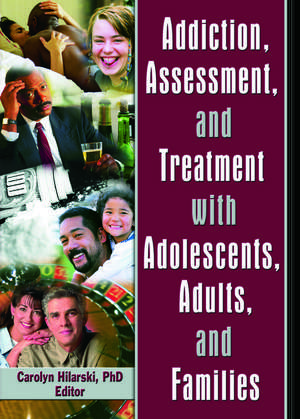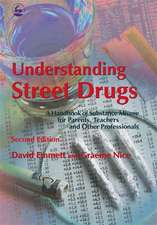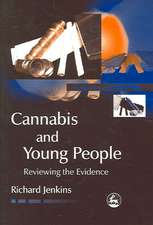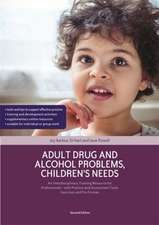Addiction, Assessment, and Treatment with Adolescents, Adults, and Families
Autor M. Carolyn Hilarskien Limba Engleză Paperback – 15 iul 2005
Addiction, Assessment, and Treatment with Adolescents, Adults, and Families examines addiction concerns ranging from prevention to relapse, offering effective intervention techniques and assessment tools to ensure delivery of the best possible service to clients who represent a variety of populations and mental health issues. Leading addiction researchers address new developments in theory, methodology, treatment, and assessment on counselor beliefs, contingency management, group treatment, rapid assessment instruments, behavioral couples therapy (BCT), family-based intervention, motivational interviewing, and 12-step programs and faith-based recovery. This essential professional and academic resource presents case studies, reviews, research findings, and empirical papers that offer unique perspectives on a variety of topics, including evidenced-based practice, theory of reasoned action, harm reduction, juvenile justice, and treatment outcomes.
Addiction, Assessment, and Treatment with Adolescents, Adults, and Families presents sophisticated, cutting-edge theory and practice concepts that provide professionals, practitioners, and educators with a more varied focus than most current available books on addiction. Counselors working in mental health settings and EAP programs, psychiatric nurses working in hospitals and outpatient settings, social workers, and students pursuing degrees in social work, nursing, psychology, and criminal justice will benefit from the book’s wide range of appropriate addiction, treatment, and prevention methodologies.
Topics addressed in Addiction, Assessment, and Treatment with Adolescents, Adults, and Families include:
- understanding the gap between research and practice in substance abuse counseling
- prevalence and patterns of illicit drug use among juvenile offenders
- the relationship between the reported substance abuse of African-American and Hispanic youth and their perceived attachments with their primary caregivers
- using a harm reduction approach to the evaluation of treatment outcomes
- using a nonconfrontational approach to substance abuse counseling when addressing client denial
- why contingency management interventions are underutilized, especially in community settings
- how to determine if and when Motivational Interviewing (MI) and Adapted Motivational Interviewing (AMI) are effective
- how to use nonabstinence-based prevention services in working with adolescents
- how to use and score the K6 scale to screen serious mental illnesses
- how to use Receiver Operating Characteristics analysis to evaluate rapid assessment instruments
Preț: 498.40 lei
Preț vechi: 524.63 lei
-5% Nou
Puncte Express: 748
Preț estimativ în valută:
95.36€ • 99.58$ • 78.75£
95.36€ • 99.58$ • 78.75£
Carte tipărită la comandă
Livrare economică 15-29 aprilie
Preluare comenzi: 021 569.72.76
Specificații
ISBN-13: 9780789028877
ISBN-10: 0789028875
Pagini: 274
Dimensiuni: 148 x 210 x 17 mm
Greutate: 0.51 kg
Ediția:1
Editura: Taylor & Francis
Colecția Routledge
Locul publicării:Oxford, United Kingdom
ISBN-10: 0789028875
Pagini: 274
Dimensiuni: 148 x 210 x 17 mm
Greutate: 0.51 kg
Ediția:1
Editura: Taylor & Francis
Colecția Routledge
Locul publicării:Oxford, United Kingdom
Cuprins
- Beliefs About Confrontation Among Substance Abuse Counselors: Are They Consistent with the Evidence? (Thomas Dale Davis)
- Twelve-Step Programs and Faith-Based Recovery: Research Controversies, Provider Perspectives, and Practice Implications (Kathleen M. Tangenberg)
- Implementation of Contingency Management Substance Abuse Treatment in Community Settings (Soo Mi Jang and Susan L. Schoppelrey)
- Motivational Interviewing and Behavior Change: How Can We Know How It Works? (Deborah Nahom)
- Iatrogenic Effects of Group Treatment on Adolescents with Conduct and Substance Use Problems: A Review of the Literature and a Presentation of a Model (Mark J. Macgowan and Eric F. Wagner)
- Empirical and Theoretical Support for the Inclusion of Non-Abstinence-Based Perspectives in Prevention Services for Substance Using Adolescents (Samuel A. MacMaster, Lori K. Holleran, and Katherine Chaffin)
- Detecting Serious Mental Illness Among Substance Abusers: Use of the K6 Screening Scale (James A. Swartz and Arthur J. Lurigio)
- Evaluating Rapid Assessment Instruments’ Psychometric Error in a Practice Setting: Use of Receiver Operating Characteristics Analysis (Timothy B. Conley)
- Substance Use in a Statewide Population of Incarcerated Juvenile Offenders (Michael G. Vaughn, Matthew O. Howard, Kirk A. Foster, Michael K. Dayton, and Jonathan L. Zelner)
- Primary Caregiver and Child Attachment: An Important Assessment Issue for Substance Use in African American and Hispanic Youth (Carolyn Hilarski)
- Defining Relapse from a Harm Reduction Perspective (Katie Witkiewitz)
- Family-Based Treatment Models Targeting Substance Use and High-Risk Behaviors Among Adolescents: A Review (Sanna J. Thompson, Elizabeth C. Pomeroy, and Kelly Gober)
- Behavioral Couples Therapy for Alcoholism and Drug Abuse: Rationale, Methods, Findings, and Future Directions (Keith Klostermann, William Fals-Stewart, Christie Gorman, Cheryl Kennedy, and Cynthia Stappenbeck)
- Index
- Reference Notes Included
Descriere
Addiction, Assessment, and Treatment with Adolescents, Adults, and Families examines addiction topics ranging from prevention to relapse, offering effective intervention techniques and assessment tools to ensure delivery of the best possible service to clients who represent a variety of populations and mental health issues. Leading addiction researchers address new developments in theory, methodology, treatment, and assessment, concerning counselor beliefs, contingency management, group treatment, rapid assessment instruments, behavioral couples therapy (BCT), family-based intervention, motivational interviewing, and 12-step programs and faith-based recovery.










